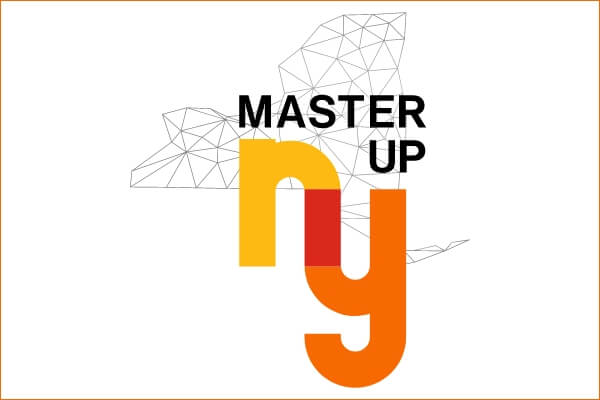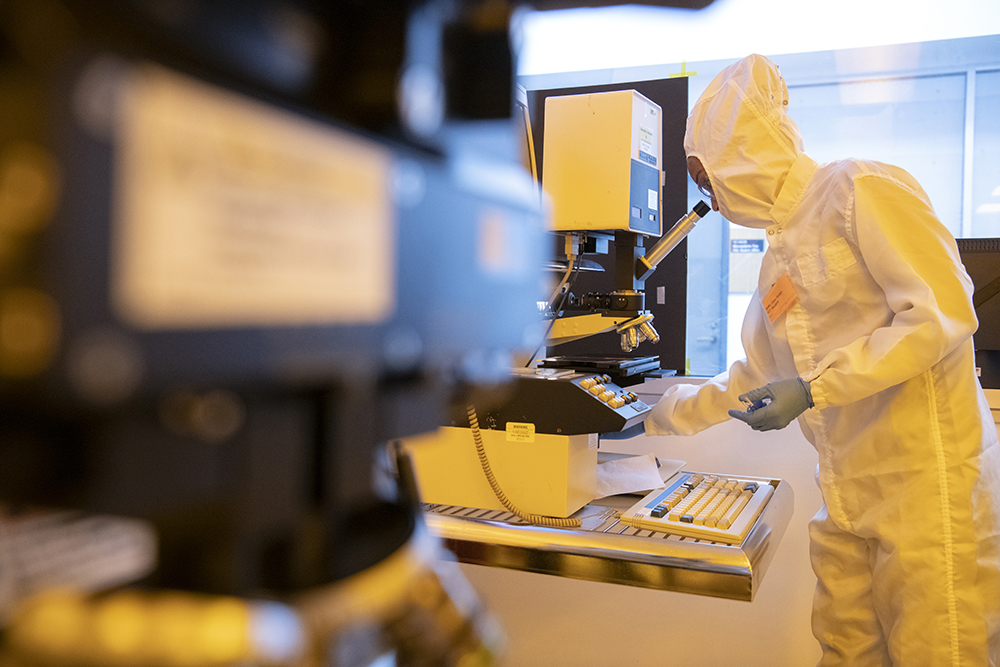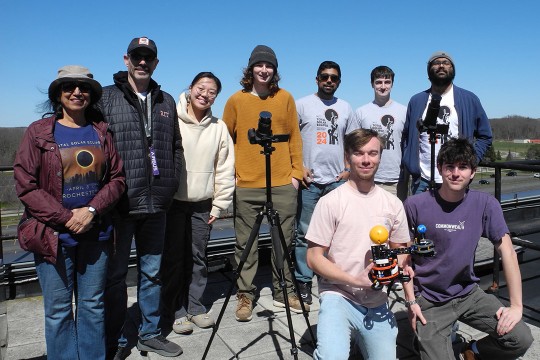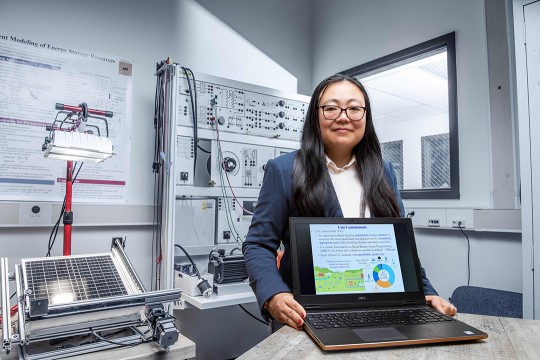Microelectronic Engineering Master of Science Degree


Microelectronic Engineering
Master of Science Degree
- RIT /
- Rochester Institute of Technology /
- Academics /
- Microelectronic Engineering MS
Request Info about graduate study
Visit
Apply
Department of Electrical and Microelectronic Engineering
Microelectronic engineering affects nearly all aspects of life–from communication, entertainment, and transportation to health, solid state lighting, and solar cells. RIT’s microelectronic engineering master’s program is a world leader in the education of semiconductor process engineers.
Overview for Microelectronic Engineering MS
Integrated microelectronic or nanoelectronic circuits and sensors drive our global economy, increase our productivity, and help improve our quality of life. Semiconductor and photonic devices impact virtually every aspect of human life, from communication, entertainment, and transportation to health, solid state lighting, and solar cells. RIT’s microelectronic engineering program is considered a world leader in the education of semiconductor process engineers.
The program is offered both on campus and online.
RIT: A World Leader in the Education of Semiconductor Process Engineers
Microelectronic engineering focuses on the study, design, and fabrication of very small electronic devices and components (micrometer scale or below). These are semiconductor and photonic devices that impact virtually every aspect of human life, from communication, entertainment, and transportation, to health, solid-state lighting, and solar cells. There is an ever-increasing need for talented engineers that not only understand the design of these devices but can direct and optimize their fabrication. Integrated nanoelectronic and microelectronic circuits and sensors drive our global economy, increase our productivity, and help improve our quality of life.
RIT’s microelectronic students are powering the future. The university’s connection to the semiconductor industry was established 40 years ago when it launched the first microelectronic engineering degree program in the country. Since then, RIT has graduated more than 1,500 engineers trained to make semiconductor devices.
RIT’s Microelectronic Engineering Degree
The microelectronic engineering master's provides a unique combination of physics, chemistry, and engineering in a state-of-the-art facility to prepare you for the real world. With internationally renowned professors with years of experience, courses are grounded in reality, with practical skill and advanced theory combined to produce comprehensive learning. In the our microelectronic engineering master's, you'll:
- Understand the fundamental scientific principles governing solid-state devices and their incorporation into modern integrated circuits.
- Understand the relevance of a process or device, either proposed or existing, to current manufacturing practices.
- Develop in-depth knowledge in existing or emerging areas of the field of microelectronics such as device engineering, circuit design, lithography, materials and processes, yield, and manufacturing.
- Apply microelectronic processing techniques to the creation/investigation of new process/device structures.
- Communicate technical material effectively through oral presentations, written reports, and publications.
The microelectronic engineering master's degree provides an opportunity for you to perform graduate-level research as you prepare for entry into either the semiconductor industry or a doctoral program. The on campus program consists of core courses, graduate electives, graduate seminar, and a research project or thesis. Students in the online version of the program complete all of the same requirements, with the exception of the graduate seminar. The degree requires strong preparation in the area of microelectronics and requires a research project or a thesis, which is undertaken once you have completed approximately 20 semester credit hours of study. Planning for both, however, should begin as early as possible. Generally, full-time students should complete their degree requirements, including thesis defense, within two years (four academic semesters and one summer term)
Students are also interested in: Computer Engineering MS, Electrical Engineering MS
Join us for Fall 2024
Many programs accept applications on a rolling, space-available basis.
30% Tuition Scholarship for NY Residents and Graduates
Now is the perfect time to earn your Master’s degree. If you’re a New York state resident with a bachelor’s degree or have/will graduate from a college or university in New York state, you are eligible to receive a 30% tuition scholarship.
Careers and Experiential Learning
Typical Job Titles
| Development Engineer | Device Engineer |
| Equipment Engineer | Manufacturing Yield Engineer |
| Photolithography Engineer | Process Engineer |
| Process Integration Engineer | Product Engineer |
| Research Engineer |
Cooperative Education and Internships
What makes an RIT education exceptional? It’s the opportunity to complete relevant, hands-on engineering co-ops and internships with top companies in every single industry. At the graduate level, and paired with an advanced degree, cooperative education and internships give you the unparalleled credentials that truly set you apart. Learn more about graduate co-op and how it provides you with the career experience employers look for in their next top hires.
Cooperative education is strongly encouraged for graduate students in the MS in microelectronic engineering.
Curriculum for 2023-2024 for Microelectronic Engineering MS
Current Students: See Curriculum Requirements
Microelectronic Engineering, MS degree, typical course sequence
| Course | Sem. Cr. Hrs. | |
|---|---|---|
| First Year | ||
| MCEE-601 | Microelectronic Fabrication This course introduces the beginning graduate student to the fabrication of solid-state devices and integrated circuits. The course presents an introduction to basic electronic components and devices, lay outs, unit processes common to all IC technologies such as substrate preparation, oxidation, diffusion and ion implantation. The course will focus on basic silicon processing. The students will be introduced to process modeling using a simulation tool such as SUPREM. The lab consists of conducting a basic metal gate PMOS process in the RIT clean room facility to fabricate and test a PMOS integrated circuit test ship. Laboratory work also provides an introduction to basic IC fabrication processes and safety. (Prerequisites: Graduate standing in the MCEE-MS or MCEMANU-ME program or permission of instructor.) Lab 3, Lecture 3 (Fall). |
3 |
| MCEE-602 | Semiconductor Process Integration This is an advanced level course in Integrated Circuit Devices and process technology. A detailed study of processing modules in modern semiconductor fabrication sequences will be done through simulation. Device engineering challenges such as shallow-junction formation, fin FETs, ultra-thin gate dielectrics, and replacement metal gates are covered. Particular emphasis will be placed on non-equilibrium effects. Silvaco Athena and Atlas will be used extensively for process simulation. Graduate paper required. (Prerequisites: MCEE-601 or equivalent course.) Lab 2, Lecture 3 (Spring). |
3 |
| MCEE-603 | Thin Films This course focuses on the deposition and etching of thin films of conductive and insulating materials for IC fabrication. A thorough overview of vacuum technology is presented to familiarize the student with the challenges of creating and operating in a controlled environment. Physical and Chemical Vapor Deposition (PVD & CVD) are discussed as methods of film deposition. Plasma etching and Chemical Mechanical Planarization (CMP) are studied as methods for selective removal of materials. Applications of these fundamental thin film processes to IC manufacturing are presented. Graduate paper required. (Prerequisites: Graduate standing in the MCEE-MS or MCEMANU-ME program or permission of instructor.) Lab 3, Lecture 2 (Fall). |
3 |
| MCEE-605 | Lithography Materials and Processes Microlithography Materials and Processes covers the chemical aspects of microlithography and resist processes. Fundamentals of polymer technology will be addressed and the chemistry of various resist platforms including novolac, styrene, and acrylate systems will be covered. Double patterning materials will also be studied. Topics include the principles of photoresist materials, including polymer synthesis, photochemistry, processing technologies and methods of process optimization. Also advanced lithographic techniques and materials, including multi-layer techniques for BARC, double patterning, TARC, and next generation materials and processes are applied to optical lithography. Graduate paper required. (Prerequisites: Graduate standing in the MCEE-MS or MCEMANU-ME program or permission of instructor.) Lab 3, Lecture 3 (Fall, Spring). |
3 |
| MCEE-732 | Microelectronics Manufacturing This course focuses on CMOS manufacturing. Topics include CMOS process technology, work in progress tracking, CMOS calculations, process technology, long channel and short channel MOSFET, isolation technologies, back-end processing and packaging. Associated is a lab for on-campus section (01) and a graduate paper/case study for distance learning section (90). The laboratory for this course is the student-run factory. Topics include Lot tracking, query processing, data collection, lot history, cycle time, turns, CPK and statistical process control, measuring factory performance, factory modeling and scheduling, cycle time management, cost of ownership, defect reduction and yield enhancement, reliability, process modeling and RIT's advanced CMOS process. Silicon wafers are processed through an entire CMOS process and tested. Students design unit processes and integrate them into a complete process. Students evaluate the process steps with calculations, simulations and lot history, and test completed devices. (Prerequisites: MCEE-601 or equivalent course.) Lecture 8 (Spring). |
3 |
| MCEE-795 | Graduate Seminar Weekly seminar series intended to present the state of the art in microelectronics research. Other research-related topics will be presented such as library search techniques, contemporary issues, ethics, patent considerations, small business opportunities, technical writing, technical reviews, effective presentations, etc. (Prerequisites: Graduate standing in the MCEE-MS or MCEMANU-ME program or permission of instructor.) Seminar 1 (Fall, Spring). |
0 |
Graduate Elective |
3 | |
| Second Year | ||
| MCEE-704 | Physical Modeling of Semiconductor Devices A senior or graduate level course on the application of simulation tools for physical design and verification of the operation of semiconductor devices. The goal of the course is to provide a more in-depth understanding of device physics through the use of simulation tools. Technology CAD tools include Silvaco (Athena/Atlas) for device simulation. The lecture will explore the various models that are used for device simulation, emphasizing the importance of complex interactions and 2-D effects as devices are scaled deep-submicron. Laboratory work involves the simulation of various device structures. Investigations will explore how changes in the device structure can influence device operation. (This course requires permission of the Instructor to enroll.) Lab 3, Lecture 3 (Fall). |
3 |
Graduate Elective |
3 | |
| Choose one of the following: | 6 |
|
| MCEE-792 | Graduate Research Project, plus a Graduate elective This course number is used to fulfill the graduate project requirement under the non-thesis option for the MS degree in Microelectronic Engineering. During this course, the student will be required to perform a literature survey, and conduct a limited scope investigation. Appropriate topics for this project may include: (i) development/characterization/documentation of semiconductor fabrication processes, (ii) characterization/measurement/documentation of semiconductor devices, or (iii) detailed simulation/design/documentation of semiconductor devices or processes. Alternative topics may be pursued with approval of the faculty advisor. The student must obtain the approval of an appropriate faculty member to supervise the paper before registering for this course. (This course is restricted to MCEE-MS Major students.) Project 3 (Fall, Spring, Summer). |
|
| MCEE-790 | MS Thesis The master's thesis in microelectronic engineering requires the student to prepare a written thesis proposal for approval by the faculty; select a thesis topic, adviser and committee; present and defend thesis before a thesis committee; prepare a written paper in a short format suitable for submission for publication in a journal. (Enrollment in this course requires permission from the department offering the course.) Thesis (Fall, Spring). |
|
| Total Semester Credit Hours | 30 |
|
* Students who are enrolled in the program and take courses on campus must complete MCEE-795 in the first year. Students who are enrolled in the program online do not take MCEE-795. Instead, they complete MCEE-792 in the second year.
Note for online students
The frequency of required and elective course offerings in the online program will vary, semester by semester, and will not always match the information presented here. Online students are advised to seek guidance from the listed program contact when developing their individual program course schedule.
Admissions and Financial Aid
This program is available on-campus or online.
On Campus
| Offered | Admit Term(s) | Application Deadline | STEM Designated |
|---|---|---|---|
| Full-time | Fall | Rolling | Yes |
| Part-time | Fall | Rolling | No |
Online
| Offered | Admit Term(s) | Application Deadline | STEM Designated |
|---|---|---|---|
| Part-time | Fall or Spring | Rolling | No |
Full-time study is 9+ semester credit hours. Part-time study is 1‑8 semester credit hours. International students requiring a visa to study at the RIT Rochester campus must study full‑time.
Application Details
To be considered for admission to the Microelectronic Engineering MS program, candidates must fulfill the following requirements:
- Complete an online graduate application.
- Submit copies of official transcript(s) (in English) of all previously completed undergraduate and graduate course work, including any transfer credit earned.
- Hold a baccalaureate degree (or US equivalent) from an accredited university or college in engineering or a related field.
- A recommended minimum cumulative GPA of 3.0 (or equivalent).
- Submit a current resume or curriculum vitae.
- Submit a personal statement of educational objectives.
- Submit two letters of recommendation.
- Entrance exam requirements: GRE required. No minimum score requirement.
- Writing samples are optional.
- Submit English language test scores (TOEFL, IELTS, PTE Academic), if required. Details are below.
English Language Test Scores
International applicants whose native language is not English must submit one of the following official English language test scores. Some international applicants may be considered for an English test requirement waiver.
| TOEFL | IELTS | PTE Academic |
|---|---|---|
| 79 | 6.5 | 56 |
International students below the minimum requirement may be considered for conditional admission. Each program requires balanced sub-scores when determining an applicant’s need for additional English language courses.
How to Apply Start or Manage Your Application
Cost and Financial Aid
An RIT graduate degree is an investment with lifelong returns. Graduate tuition varies by degree, the number of credits taken per semester, and delivery method. View the general cost of attendance or estimate the cost of your graduate degree.
A combination of sources can help fund your graduate degree. Learn how to fund your degree
Additional Information
Bridge Courses
Applicants applying with a bachelor’s degree in fields outside of electrical and microelectronic engineering may be considered for admission; however, bridge courses may be required to ensure the student is adequately prepared for graduate study.
Online Degree Information
The Microelectronic Engineering MS program is designed to be completed part-time (1 or 2 courses per term). Time to completion depends on the plan of study, when courses are offered, selected electives, and if the student takes a summer course. Courses may be synchronous or asynchronous. Academic advisors work with students on a study plan after admission to ensure classes fit student availability. Typically students finish this degree in 24-36 months. For specific details about the delivery format and learning experience, contact the Program Contact listed on this page. RIT does not offer student visas for online study.
Online Tuition Eligibility
The online Microelectronic Engineering MS is a designated online degree program that is billed at a 43% discount from our on-campus rate. View the current online tuition rate.
Online Study Restrictions for Some International Students
Certain countries are subject to comprehensive embargoes under US Export Controls, which prohibit virtually ALL exports, imports, and other transactions without a license or other US Government authorization. Learners from the Crimea region of the Ukraine, Cuba, Iran, North Korea, and Syria may not register for RIT online courses. Nor may individuals on the United States Treasury Department’s list of Specially Designated Nationals or the United States Commerce Department’s table of Deny Orders. By registering for RIT online courses, you represent and warrant that you are not located in, under the control of, or a national or resident of any such country or on any such list.
Research
Please visit the research profiles on the electrical and microelectronic engineering department for an overview of research opportunities. Visit individual faculty profiles for a more complete list of research advisors in the program.
Latest News
-
April 10, 2024
![a group of researchers gathers around a camera used to capture the eclipse.]()
University researchers measure the sun during the eclipse to assess impact on solar arrays
The recent total solar eclipse over Rochester provided a once-in-a-lifetime opportunity on Earth for two faculty-researchers and their students to capture data about the effects of the sun’s energy during a total eclipse.
-
February 9, 2024
![Bing Yan is shown working in a lab holding a laptop that is facing the camera showing a slide from a presentation deck]()
Electrical engineering faculty member recognized with CAREER Award
Bing Yan, an assistant professor of electrical engineering, is building a more coordinated system to manage different variables affecting grid energy generation, storage, transmission, and distribution—from extreme weather events to the addition of solar and wind power.
-
May 21, 2023
![person wearing clean suit handling a semiconductor.]()
Rochester Institute of Technology takes its place on international stage at G7 to advance semiconductor development
RIT is one of six U.S. universities named as part of an international partnership to improve competitiveness in computer chip design, development, and manufacturing. Micron Corp. and the National Science Foundation announced the partnership and signed a Memorandum of Understanding (MOU) at the 2023 G7 Summit in Japan.



















